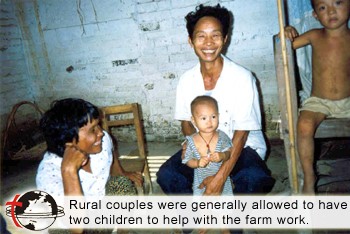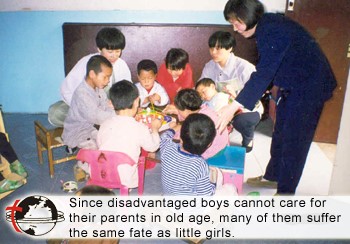
China Bridge (神州橋樑)_2004/Sep
China’s Gender Dilemma
In China some 30 million men will soon be unable to find a Chinese wife. How did such a bizarre situation come about in a country of some 1.3 billion people? There are several reasons. The one-child policy operative since 1979; China’s preference for boys; the abandonment of little girls; and female infanticide.
The one-child policy

The Chinese government initiated its family planning policy in 1973 and implemented the one-child policy in 1979. The one-child policy has never been written into law, but in most areas of China, especially in large cities, it has been strictly enforced.
Until very recently, those who failed to follow the policy, especially in urban areas, were punished by a system of fines. Occasionally, a whole work unit was punished if one of the members had an unauthorized pregnancy. On the other hand, those who followed the policy were often rewarded financially, given land grants, education, housing and employment opportunities.
In spite of this system of reward and punishment, many families still managed to have more than one child. A quick trip within China’s rural areas is enough to convince any casual observer that some families have as many as four children. This is particularly true of Catholic and Muslim families in China’s villages. The draconian policies of forced abortions and sterilisation have been a great burden on their consciences and they generally preferred to pay the punitive fines.
The one-child policy did not apply as strictly within the minority communities where the rate of infant deaths is very high. The policy was also relaxed for those parents who gave birth to a handicapped child; they were generally given permission to have a second one. According to the People’s Daily (July 14) from 800,000 to 1.2 million children are born with birth defects each year. In general, the policy urges delayed marriages, delayed child bearing and mandates one child per couple.
Change in policy

In July 2000, China’s family planners decided to soften the policy by suggesting non-coercive alternatives, using key words such as choice and education. In July 2004, China launched a pilot project in some rural areas, shifting the focus from punitive measures to cash rewards for rural couples who had not violated the family planning policy between 1973 and 2001. According to China Economic Net (August 31), over five thousand rural residents in Qiqihar, Heilongjiang province, all people aged 60 or above, will receive 600 yuan annually for the rest of their lives for having followed the policy during their childbearing years.
People are precious
Mao Zedong encouraged couples to have many children, “Of everything in the world,” he said, “people are the most precious.” With this encouragement China’s population grew in leaps and bounds, putting a heavy strain on China’s resources and its ability to modernise, to improve the quality of life of its citizens and to eradicate poverty.
China must care for and feed one fifth of the world’s population. The one-child policy was meant to be an effective tool ensuring that this could be done. China maintains that had it not enforced family planning and the one-child policy, its population today would be 1.6 billion instead of 1.3 billion.
Short-term advantages
The short-term advantages of the policy are obvious. The decrease in population relieves pressure on the government; resources go farther; women can receive better medical maternity care since fewer children are born; an only child gets more attention from relatives; the child is more likely to have a better education; and the mother can pursue a career outside the home. Critics complain, however, that this is too shortsighted.
Long-term disadvantages
The one-child policy is significantly responsible for the skewed male-to-female ratio in China. China presently has a demographic problem of major proportions since it has the most serious gender imbalance of any country on earth.
According to the Knight Ridder newspaper (June 22, 2004) China now has 12.7 million more boys than girls under the age of nine. This means that by 2020 there may be from 30 to 40 million young men looking for non-existent brides.
While estimates vary significantly, the ratio is sufficiently skewed for the government to voice its concern publicly. Ratios vary in different provinces with the deviation, according to the last census, estimated to be about 120 males to 100 females. In Jiangxi province, however, the ratio stands at 138 males to 100 females. The ratio is about the same in Guangdong with 137 males to 100 females. The normal universal ratio is 105-107 male births to 100 female births.
This disparity is usually explained by the fact that females are generally stronger. Male babies have a higher infant death rate than little girls. Nature compensates with a slightly higher number of male to female births.
China’s alarming lopsided ratios are already making it difficult for many men to find wives and have caused the United Nations to sound the alarm fearing that within a decade it is possible that between 20 to 40 million girls will have gone missing. Currently, there are campaigns encouraging families to safeguard little girls.
The inability of the men to find wives has given rise to another evil: trafficking in women. Thousands of Vietnamese women, some as young as 13, according to the Beijing Review, (August 19), are brought to China illegally and bought by Chinese men for as little as 300 yuan. Many others are sold into secret illegal prostitution. The UNICEF office in China estimates that between 10,000 and 12,000 Vietnamese women and girls were trafficked into China in 2003 alone.
Another rarely mentioned disadvantage is that, over a period of time, the offspring of the one-child family is a child without brothers or sisters who ends up having no aunts or uncles and no cousins. This distorts the whole concept of the family supposedly so dear to the Chinese and so deeply rooted in Chinese culture.
Preference for boys
A Chinese couple must not only obtain permission to marry – this law is now being relaxed somewhat – but it must also have permission to have a child.
The cultural tradition in most Asian countries is to prefer a male to a female child. To ensure a male birth, women resort to sex selection through the use of ultrasound technology. Since 1992, however, the government has banned the use of ultrasound for gender selection. But women still find a way.
Many doctors are eager to make extra money and so are willing to risk the penalty for breaking the law, which is often only about 30 yuan. In any case and more often than not, if the unborn is a girl, the mother will opt for an abortion.
This preference for boys is partially responsible for many human rights violations and sex discrimination against girls in China and throughout all of Asia. Female foetuses are routinely aborted. Baby girls in large numbers are abandoned, drowned, smothered or left to die from lack of care and food. They are often left in rice fields or in rubbish bins.
Babies are also left at church doors with their mothers hoping that someone will pick them up and bring them to a church or state orphanage where foreigners may later adopt them. Those parents who keep their baby girls, but who still want a male child fail to register the little girl with the government.
Technically, an unregistered child does not exist and as such, has no right to education. They are left without adequate employment opportunities; are unable to marry, move to another location and are relegated to a life of servitude and poverty. Bribes to local officials, of course, can minimize these disadvantages!
Orphanages in China have very few males and those found orphanages are disadvantaged. Since a disadvantaged male child cannot easily care for his parents in their old age, nor can he carry on the family line, he is no better than a girl and is therefore abandoned so his parents can try again for a healthy male child.
One reason a female child is so undervalued is that China is still, by and large, a rural country. The hard work in the fields is more suited to men than to women. Also when women get married they are thought to be of little use or no value to their own kin since they leave to attend to their husband’s family.
As China keeps developing economically, ideas, customs and lifestyles are also changing. Many of these affect the concept of marriage and family.
Young couples, who have tasted the freedom of living away from their families and having their own apartments and women who have found a career outside the home rewarding, are opting, without any push from the government, to have only one child or even to have none at all. Such an attitude will thrust China into another demographic problem: an ageing and aged population.
Church efforts
The Church in China rarely directly confronts the population problem since this would be in direct violation of the law, but it is helping in various ways: teaching acceptable methods of birth control – these are also valued by Muslims – caring for abandoned children and orphans and stressing the equal value of the human person whether male or female.


 ENG
ENG